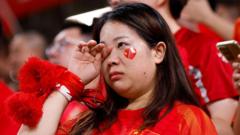China's current men's team, ranked 90th in FIFA standings, experienced a devastating loss to Japan, culminating in an unprecedented 7-0 defeat during World Cup qualifiers. This lamentable performance reflects a broader trend of failures, including losses to nations like Oman and Uzbekistan. The struggles of the team are now compounded by a corruption scandal that has seen many prominent figures, including players and coaches, arrested for match-fixing and bribery. The fallout from these incidents underscores a growing disconnect between the ambitions of the Chinese government and the realities of domestic football.
Under Xi Jinping’s leadership, China set out ambitious goals for football, aiming to qualify for the World Cup and even host and win the tournament. However, current events indicate a painful regression. Despite Xi's passion for football, the long-standing interference of the Communist Party stifles genuine reform. Experts emphasize that decisions regarding football must originate from grassroots levels, but the current system entrenched in political oversight remains an impediment to the sport’s success.
The lack of structural support means that China has failed to cultivate a sustainable football culture, with fewer than 100,000 registered football players in a nation of 1.4 billion. Comparatively, footballing giants like England boast over a million registered players. This deficiency in player development is exacerbated by a lack of competitive grassroots leagues—essential for fostering top talent.
While the men's football team languishes near the bottom of world rankings, the women’s team has found success. Still, the overall performance and declining interest in the men’s game raise questions about the future of football in China. The domestic league once thrived, attracting international stars and significant investments. Yet, following the pandemic, over 40 clubs have gone bankrupt, revealing the fragile financial ecosystem of Chinese football.
Despite the heartbreak, fans remain passionate. While public sentiment reflects disappointment, humor mitigates the sting, with some fans quipping that consistency is the only thing the national team is good at. The sport’s viability rests on rekindling a grassroots movement and implementing accountability and transparency to rebuild trust and enthusiasm in a game that desperately needs revitalization.
Looking forward, the roadmap for recovery and success in Chinese football involves re-evaluating the top-down political frameworks and cultivating a culture that embraces genuine talent development from the ground up. Critics assert that as long as strict political oversight persists, the dream of a resounding footballing success for China remains far from attainable.
Under Xi Jinping’s leadership, China set out ambitious goals for football, aiming to qualify for the World Cup and even host and win the tournament. However, current events indicate a painful regression. Despite Xi's passion for football, the long-standing interference of the Communist Party stifles genuine reform. Experts emphasize that decisions regarding football must originate from grassroots levels, but the current system entrenched in political oversight remains an impediment to the sport’s success.
The lack of structural support means that China has failed to cultivate a sustainable football culture, with fewer than 100,000 registered football players in a nation of 1.4 billion. Comparatively, footballing giants like England boast over a million registered players. This deficiency in player development is exacerbated by a lack of competitive grassroots leagues—essential for fostering top talent.
While the men's football team languishes near the bottom of world rankings, the women’s team has found success. Still, the overall performance and declining interest in the men’s game raise questions about the future of football in China. The domestic league once thrived, attracting international stars and significant investments. Yet, following the pandemic, over 40 clubs have gone bankrupt, revealing the fragile financial ecosystem of Chinese football.
Despite the heartbreak, fans remain passionate. While public sentiment reflects disappointment, humor mitigates the sting, with some fans quipping that consistency is the only thing the national team is good at. The sport’s viability rests on rekindling a grassroots movement and implementing accountability and transparency to rebuild trust and enthusiasm in a game that desperately needs revitalization.
Looking forward, the roadmap for recovery and success in Chinese football involves re-evaluating the top-down political frameworks and cultivating a culture that embraces genuine talent development from the ground up. Critics assert that as long as strict political oversight persists, the dream of a resounding footballing success for China remains far from attainable.


















